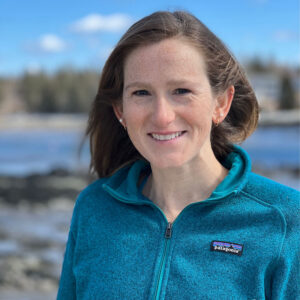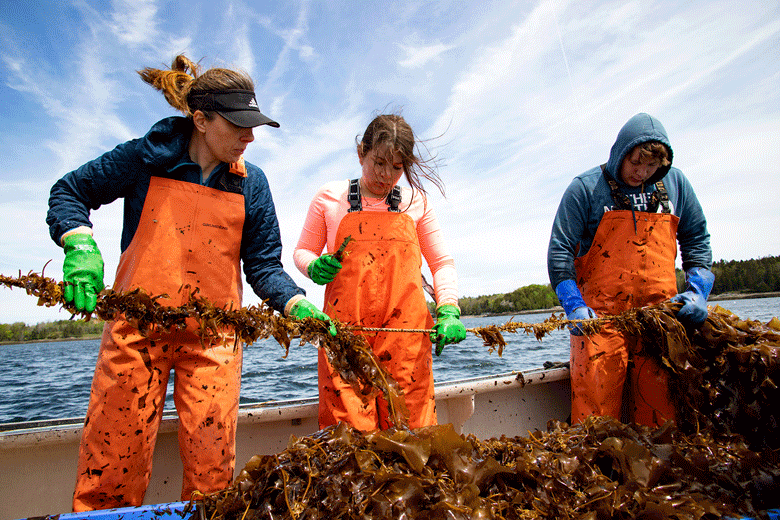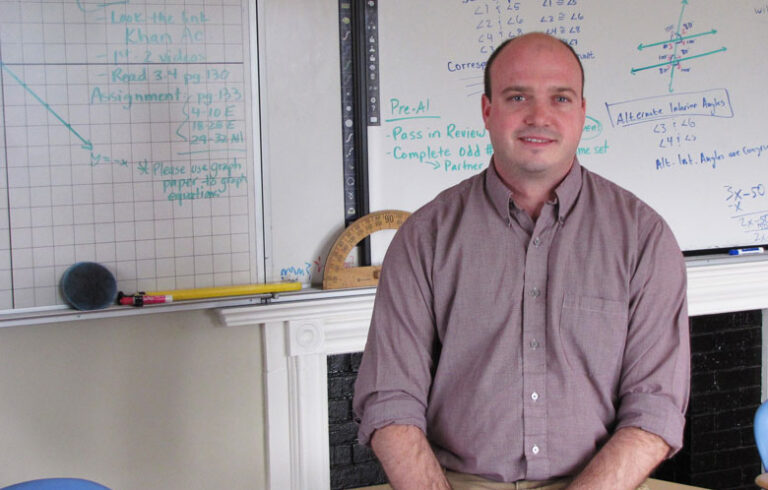Aquaculture is the fastest growing food production sector in the world. The United Nation’s sustainable development goals identify aquaculture as playing a key role in development that safeguards “food security, livelihoods, human dignity, and natural resources.”
As we find ourselves needing to produce more food to support a growing population, many countries have turned to the sea. Yet the U.S. ranks only 18th in aquaculture production despite importing more than 85% of our seafood, of which more than half is produced by aquaculture.
While freshwater aquaculture represents the majority of U.S. production (namely catfish), marine aquaculture is a burgeoning industry in this country. Here in Maine, we have had an aquaculture industry since the1970s, beginning with Atlantic salmon, mussels, and oysters.
Maine is the largest producer of farmed kelp in the country.
Not only are we a leading producer of marine aquaculture in the U.S., but Maine is the largest producer of farmed kelp in the country. This sector is small but mighty, producing about 500,000 pounds in 2020 and it was the only aquaculture sector in Maine to grow in 2020 amid the COVID pandemic.

Since 2012 the Island Institute has been working to help fishermen diversify their incomes, first through the Aquaculture in Shared Waters program and then through our own Aquaculture Business Development (ABD) program in 2016. Over the years we have helped educate potential kelp farmers on the ins and outs of both the farming process and the necessities of running a business and have provided grants to mitigate start-up costs.
In four years, the ABD program helped 34 farms launch, contributing to the local economy of many coastal communities. Recently, we have begun tours of seaweed and shellfish farms to educate and inform the public about the process of farming and offer close-up views of a farm.
Because kelp is a crop that is set out in the fall (October-November) and harvested in spring (April-May), our first tours were in Spruce Head to see farmers harvest their product for this year.
With the help of Atlantic Sea Farms, we were able to see two lobstermen turned off-season kelp farmers and their crews harvest lines on their four-acre farms. Atlantic Sea Farms partners with fishermen looking to make additional money in their off-season and are already equipped with the boats and skills necessary to farm kelp.
Atlantic Sea Farms supplies the kelp seed and harvest bags and coordinates with the farmers to pick up their product at the dock as soon as it’s harvested. Farmers make approximately 60-70 cents per pound of wet product and a 1,000-foot line can produce as much as 5,000 pounds of kelp. In 2022 Atlantic Sea Farms partnered with 24 fishermen to grow 973,000 pounds of kelp and still could not keep up with demand.
The kelp is transported in a refrigerated truck back to Portland where it is processed into a variety of products including kelp burgers, cubes for smoothies, “sea-chi” and “sea-kraut,” and a number of other products. Aside from its health benefits, this macroalgae absorbs nitrogen, phosphorous, and carbon dioxide to grow, leaving the water cleaner than when it started.
While we know that producing meat requires intensive uses of carbon, freshwater, and land, Americans have been slow to adapt to the mentality that some of our food needs to be grown in the ocean to feed us. T,here is an incredible opportunity to grow our young aquaculture industry in the cold, clean waters of Maine.
While the kelp harvest season has ended, we will begin similar visits for shellfish tours in the near future and look forward to talking to you about these farming processes in the near future.
Molly Miller is community development officer with Island Institute, publisher of The Working Waterfront, working in the Center for Marine Economy on working waterfront resilience and the expansion of seaweed and shellfish aquaculture. She may be contacted at mmiller@islandinstitute.org.





